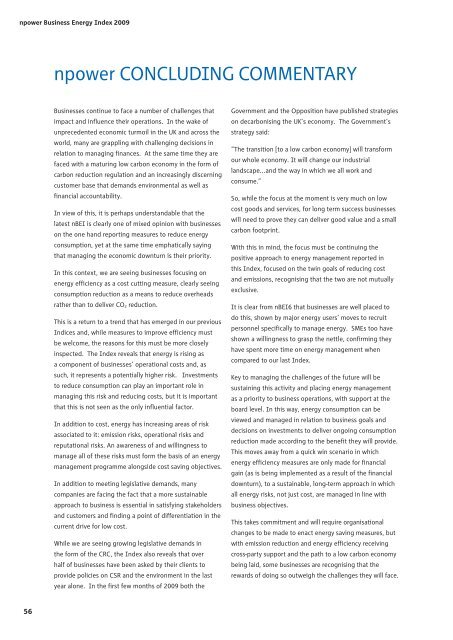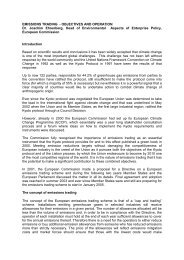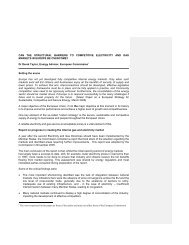Business Energy Users Survey - Winter 2008/09 - Moffatt Associates
Business Energy Users Survey - Winter 2008/09 - Moffatt Associates
Business Energy Users Survey - Winter 2008/09 - Moffatt Associates
Create successful ePaper yourself
Turn your PDF publications into a flip-book with our unique Google optimized e-Paper software.
npower <strong>Business</strong> <strong>Energy</strong> Index 20<strong>09</strong>npower <strong>Business</strong> <strong>Energy</strong> Index 20<strong>09</strong>npower concluding commentary<strong>Business</strong>es continue to face a number of challenges thatimpact and influence their operations. In the wake ofunprecedented economic turmoil in the UK and across theworld, many are grappling with challenging decisions inrelation to managing finances. At the same time they arefaced with a maturing low carbon economy in the form ofcarbon reduction regulation and an increasingly discerningcustomer base that demands environmental as well asfinancial accountability.In view of this, it is perhaps understandable that thelatest nBEI is clearly one of mixed opinion with businesseson the one hand reporting measures to reduce energyconsumption, yet at the same time emphatically sayingthat managing the economic downturn is their priority.In this context, we are seeing businesses focusing onenergy efficiency as a cost cutting measure, clearly seeingconsumption reduction as a means to reduce overheadsrather than to deliver CO 2 reduction.This is a return to a trend that has emerged in our previousIndices and, while measures to improve efficiency mustbe welcome, the reasons for this must be more closelyinspected. The Index reveals that energy is rising asa component of businesses’ operational costs and, assuch, it represents a potentially higher risk. Investmentsto reduce consumption can play an important role inmanaging this risk and reducing costs, but it is importantthat this is not seen as the only influential factor.In addition to cost, energy has increasing areas of riskassociated to it: emission risks, operational risks andreputational risks. An awareness of and willingness tomanage all of these risks must form the basis of an energymanagement programme alongside cost saving objectives.In addition to meeting legislative demands, manycompanies are facing the fact that a more sustainableapproach to business is essential in satisfying stakeholdersand customers and finding a point of differentiation in thecurrent drive for low cost.While we are seeing growing legislative demands inthe form of the CRC, the Index also reveals that overhalf of businesses have been asked by their clients toprovide policies on CSR and the environment in the lastyear alone. In the first few months of 20<strong>09</strong> both theGovernment and the Opposition have published strategieson decarbonising the UK’s economy. The Government’sstrategy said:“The transition [to a low carbon economy] will transformour whole economy. It will change our industriallandscape...and the way in which we all work andconsume.”So, while the focus at the moment is very much on lowcost goods and services, for long term success businesseswill need to prove they can deliver good value and a smallcarbon footprint.With this in mind, the focus must be continuing thepositive approach to energy management reported inthis Index, focused on the twin goals of reducing costand emissions, recognising that the two are not mutuallyexclusive.It is clear from nBEI6 that businesses are well placed todo this, shown by major energy users’ moves to recruitpersonnel specifically to manage energy. SMEs too haveshown a willingness to grasp the nettle, confirming theyhave spent more time on energy management whencompared to our last Index.Key to managing the challenges of the future will besustaining this activity and placing energy managementas a priority to business operations, with support at theboard level. In this way, energy consumption can beviewed and managed in relation to business goals anddecisions on investments to deliver ongoing consumptionreduction made according to the benefit they will provide.This moves away from a quick win scenario in whichenergy efficiency measures are only made for financialgain (as is being implemented as a result of the financialdownturn), to a sustainable, long-term approach in whichall energy risks, not just cost, are managed in line withbusiness objectives.This takes commitment and will require organisationalchanges to be made to enact energy saving measures, butwith emission reduction and energy efficiency receivingcross-party support and the path to a low carbon economybeing laid, some businesses are recognising that therewards of doing so outweigh the challenges they will face.5657




